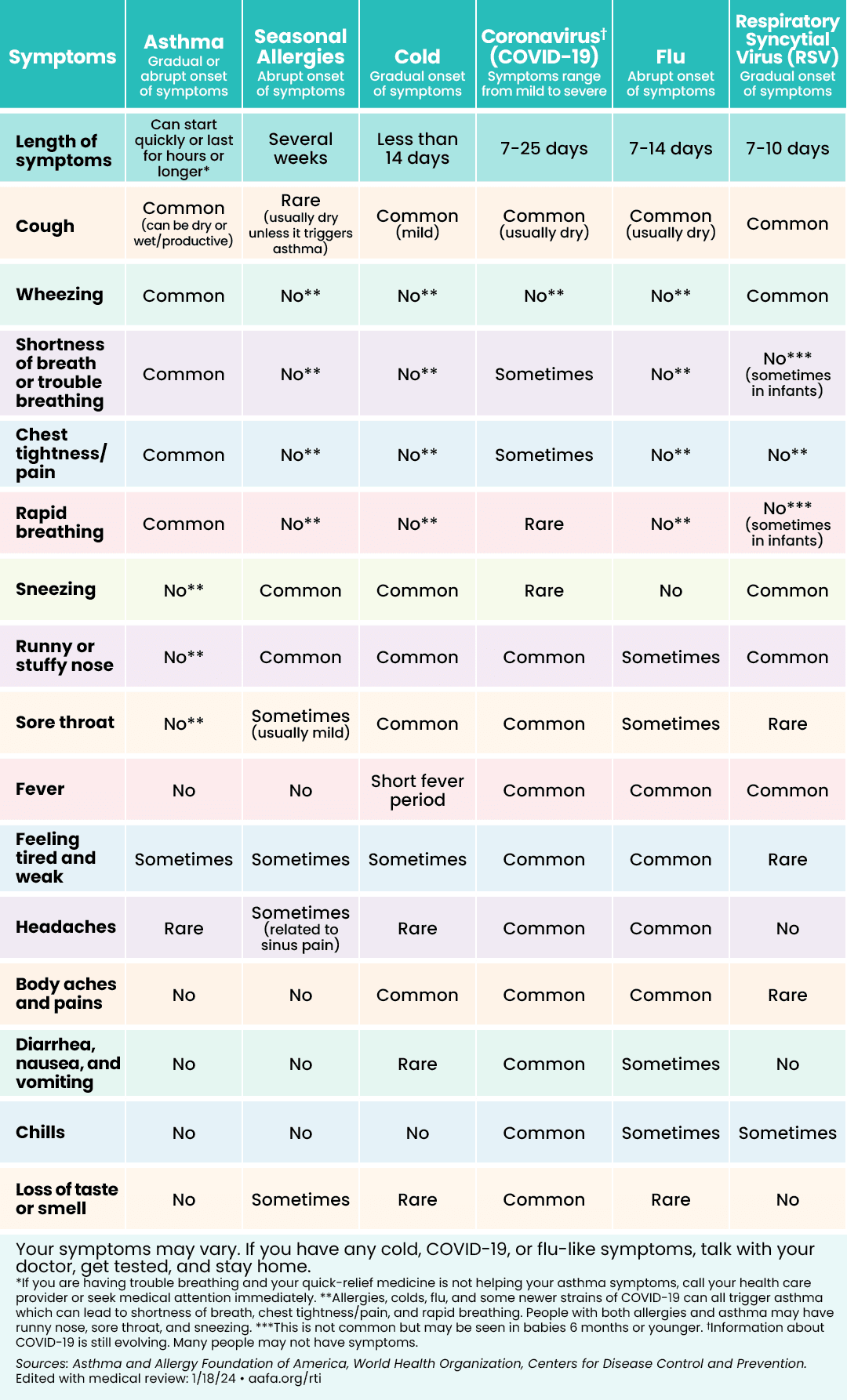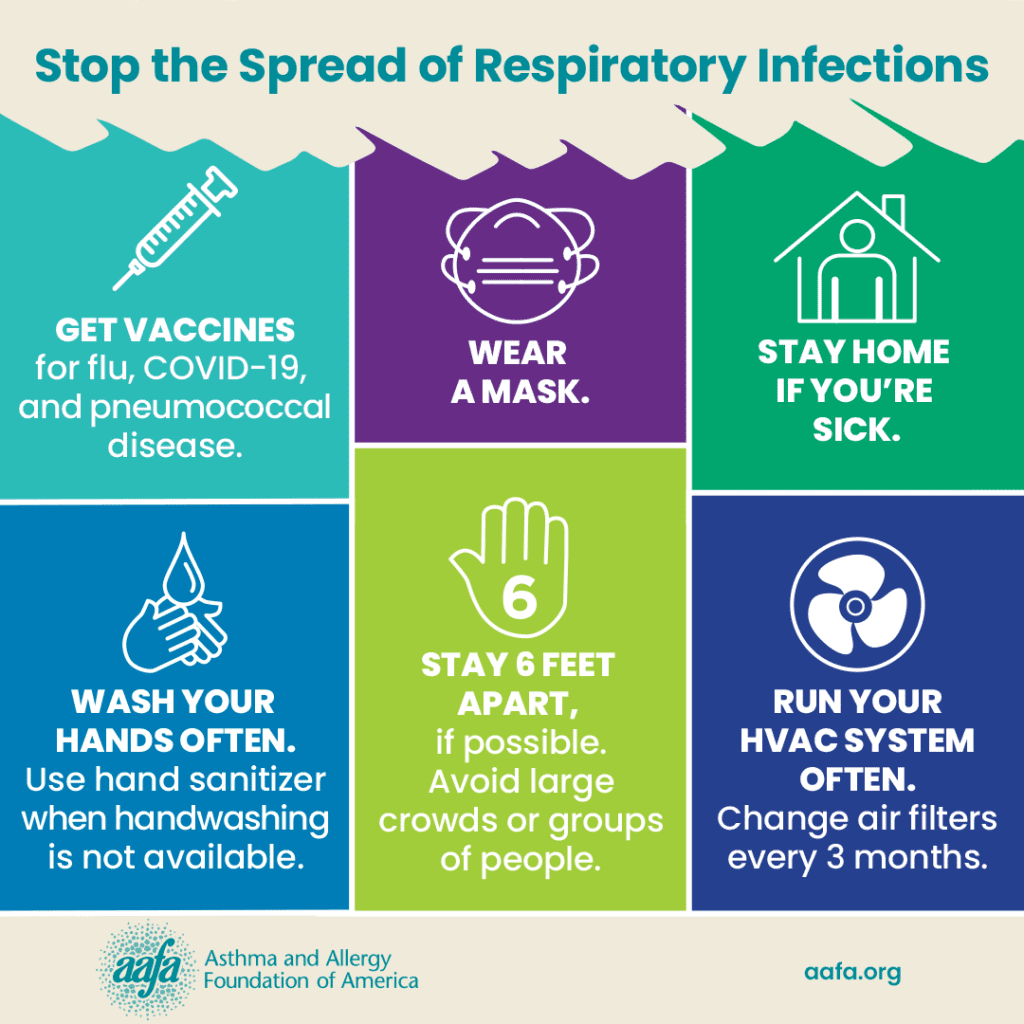Asthma
Flu (Influenza)
If you have asthma, protecting yourself from the flu is very important. The flu is a contagious respiratory illness caused by influenza viruses.
The flu can cause mild to severe illness. If left untreated, it could lead to pneumonia or other complications (serious health problems), especially in people ages 65 and older, people who are pregnant, and people with medical conditions such as asthma, heart disease, and kidney disease.
What Are Symptoms of the Flu?
The flu usually starts suddenly and may include these symptoms:
- Fever (often very high, 101 or above)
- Headache
- Extreme tiredness or weakness
- Chills
- Constant cough
- Sore throat
- Runny or stuffy nose
- Body aches in bones and/or muscles
- Diarrhea and vomiting (more common in children)
Symptoms from other illnesses like COVID-19, the common cold, respiratory syncytial virus (RSV), allergies, or asthma can be similar to the flu and may be confusing. You can also have other respiratory illnesses (such as COVID-19 and RSV) at the same time.
 |  |
Click to see larger image (English) | Click to see larger image (Spanish) |
What Are Emergency Flu Symptoms?
Some signs and symptoms need emergency medical care right away. Call 911 if you or your child has these symptoms.
For children, emergency symptoms include:
- Rapid breathing or difficulty breathing
- Cyanosis – tissue color changes on mucus membranes (like tongue, lips, and around the eyes) and fingertips or nail beds – the color appears grayish or whitish on darker skin tones and bluish on lighter skin tones
- Not waking up, not interacting, or not conscious
- Flu-like symptoms seem to improve but return with worse fever and cough
- Fever with a rash
- Serious or constant vomiting
- Irritable and difficult to comfort (in addition to other flu symptoms)
For adults, emergency symptoms include:
- Rapid breathing or difficulty breathing
- Pain in the chest or abdomen
- Sudden dizziness
- Confusion
- Not waking up, not interacting, or not conscious
- Severe or persistent vomiting
What Is the Best Treatment for the Flu?
If you think you have the flu, you can get tested at urgent care centers, walk-in clinics, or your local pharmacy. You can also use an at-home test kit. If you get flu-like symptoms or test positive, contact your doctor right away.
If possible, it is best to get tested within the first one to two days of illness. You may also need a doctor’s exam to tell if you have a complication from the flu, such as pneumonia.
There are antiviral drugs approved to treat the flu. Flu antiviral drugs are prescription medicines that can help your body fight against the flu virus. They can lessen symptoms, such as fever or body aches and can also cut down on the amount of time you are sick. They may also reduce complications if you have asthma or other respiratory illnesses. If you take them early enough, you may have milder illness rather than a more severe illness.
Flu antivirals work best when started within one to two days after you start having flu symptoms, especially if you are at higher risk of complications from the flu, are very sick, or in the hospital with the flu. Children can also take flu antivirals.
Talk with your doctor about these prescription medicines. You need to start antiviral treatments within two days of when you start to have symptoms.
There are four antiviral drugs recommended by the Centers for Disease Control and Prevention (CDC) to treat the flu:
- Oseltamivir phosphate (Tamiflu®)
- Zanamivir (Relenza®)
- Peramivir (Rapivab®)
- Baloxavir marboxil (Xofluza®)
Get a lot of rest, drink plenty of liquids, and avoid using alcohol and tobacco if you get the flu. Before taking over-the-counter medicines to help relieve flu symptoms, talk with your doctor. Some over-the-counter medicines or supplements can interfere with other medicines you may be taking.
How Does the Flu Spread?
The flu is contagious. The flu spreads from coughing and sneezing. It usually spreads from person to person. You can also get the flu by touching something (such as doorknobs or tables) with the flu virus on it or by shaking hands and then touching your mouth or nose. You can spread the flu before you know you are sick and while you are sick.
The flu typically spreads in the United States from fall through spring each year.
Are People with Asthma at High Risk for Complications from the Flu?
The flu can affect your lungs when you have asthma. It can cause inflammation (swelling) and narrowing of your airways. These changes could trigger or worsen asthma symptoms, such as cough, wheezing, shortness of breath, and chest tightness. People with asthma are at a higher risk of having complications from the flu, such as pneumonia. Pneumonia is an infection of the lungs caused by viruses or bacteria. It can be serious for people with asthma.
If you have asthma, defending yourself against the flu is very important.
How Can I Protect Myself and Other People from the Flu?
Here is what you can do to avoid the flu:
- Get the flu vaccine every year. People who are 6 months and older should get a flu vaccine, which can prevent influenza. See the sections “Who Should Get the Flu Vaccine?” and “Who Should Not Get the Flu Vaccine?” below.
- Make it a family affair. Vaccinate the whole family to protect family members who have asthma.
- Prevent exposure. The flu can be very contagious. Wash your hands well for at least 20 seconds and often (or use alcohol-based hand sanitizer if soap and water aren’t available), don’t touch your face, and don’t share food or utensils. If possible, avoid people who are sick. Wearing a mask helps to protect you when you are in close contact with someone who is ill.
- Talk with your doctor. Update your Asthma Action Plan with your doctor so you know what to do if you get sick.
- If you get sick with flu symptoms, call your doctor immediately. People with asthma can quickly become sicker with the flu. Your doctor may recommend treatment with an antiviral medicine and/or a change to your regular asthma treatment.

Who Should Get the Flu Vaccine?
People who are 6 months and older should get a flu vaccine every year. Get a flu vaccine every year when it becomes available, usually between August and October.
Every year, new batches of the flu vaccine are made with different virus strains. The vaccine encourages your body to make antibodies to help you fight off flu infection.
If you get the flu vaccine, you are less likely to catch the flu virus. And if you do get sick with flu, you are more likely to recover easily and have a lower risk of complications. The flu vaccine can also help reduce your or your child’s risk of severe illness from more than one respiratory infection.
There are different flu vaccines for different ages. The high-dose vaccine is for people ages 65 and older.
The flu vaccine is available as a shot or a nasal spray. AAFA recommends that people with asthma of any age get the flu shot. The CDC does not recommend the nasal spray in most cases for people with asthma.
If you or your child (ages 5 and older) must have a needle-free option and your asthma is well-controlled, talk with your doctor about nasal spray vaccine options.
Children ages 2 to 4 who have asthma or a history of wheezing the past 12 months should not get the nasal spray vaccine.
See the CDC’s full guidelines on the flu vaccine for more information.

The vaccine is safe. If you have asthma, the risks of flu complications are far greater than not getting the vaccine.
If you care for children with asthma or live with people with asthma, get the flu vaccine to protect them.2
Who Should Not Get the Flu Vaccine?
Children younger than 6 months of age are too young to get a flu shot.
If you have a latex allergy or have had a reaction to a previous flu shot, talk with your doctor before getting a flu shot.
If you have severe, life-threatening allergies (anaphylaxis) to any ingredient in a flu vaccine (other than egg proteins), you should not get the shot.
Can I Get the Flu Vaccine If I Have an Egg Allergy?
If you have an egg allergy, you can safely get a flu shot. This is true no matter how severe your egg allergy was in the past. This includes people who have a history of a severe allergic reaction or anaphylaxis after eating egg or egg-containing foods.
Egg allergy is not a reason to avoid the flu vaccine. It is safe for ALL people with an egg allergy to receive an annual flu vaccine.

The following organizations recommend getting the flu vaccine every year, even if you have an egg allergy:
- Asthma and Allergy Foundation of America (AAFA)
- Centers for Disease Control and Prevention (CDC)
- American Academy of Pediatrics (AAP)
- American Academy of Allergy, Asthma, and Immunology (AAAAI)
- American College of Allergy, Asthma, and Immunology (ACAAI)
You can get any flu vaccine, even if you have a history of mild or severe egg allergy. You can get the shot or nasal spray, depending on the recommendations above if you have asthma. You do not need to be observed in a doctor’s office for 30 minutes after getting the vaccine if you have or had an egg allergy.
The AAAAI, ACAAI, and CDC state that the vaccine is safe to give in any setting. There is no special waiting time or other precautions.4
Medical Review: December 2023 by John James, MD
Closed
References
- Flu and People with Asthma | Seasonal Influenza (Flu) | CDC. (2023). Cdc.gov. Retrieved December 18, 2023, from Flu & People with Asthma | CDC.
- Who Needs a Flu Vaccine. (2023). Centers for Disease Control and Prevention. Retrieved December 18, 2023, from Who Needs a Flu Vaccine | CDC.
- Centers for Disease Control and Prevention. (2020, September 22). Flu vaccine and people with egg allergies. Centers for Disease Control and Prevention. Retrieved December 18, 2023 Flu Vaccine and People with Egg Allergies | CDC.
- Greenhawt, M., Turner, P. J., & Kelso, J. M. (2018). Administration of influenza vaccines to egg allergic recipients: A practice parameter update 2017. Annals of Allergy, Asthma & Immunology, 120(1), 49–52. https://doi.org/10.1016/j.anai.2017.10.020.










